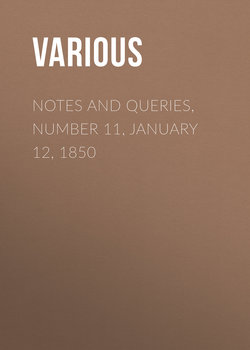Читать книгу Notes and Queries, Number 11, January 12, 1850 - Various - Страница 2
SIR EDWARD DERING'S 1 HOUSEHOLD BOOK, A.D. 1648-52
ОглавлениеAbout ten years since, I remember seeing, in the hands of a London bookseller, a curious MS. purporting to be the "Household Book of Receipts and Expences of Sir Edward Dering, Bart., of Surrenden Dering, Kent, from Lady-Day, 1648, to April, 1652." It was a think folio, in the original binding, entirely in the hand-writing of the distinguished baronet.
Sir Edward was the only son of Sir Edward Dering, the first baronet, by his second wife, Anne, daughter of Sir John Ashburnham, of Ashburnham, Sussex, Knt. He succeeded to the baronetcy upon the death of his father, in 1644, and married Mary, daughter of Daniel Harvey, Esq., of Combe, Surrey, who was brother of the famous Dr. Harvey, the discoverer of the circulations of the blood.
The volume commences at Lady-day, 1648, with the gifts of his grandmother Cramond, and his uncles Dr. Harvey and Eliab Harvey. Nov. 8. 1648, is a memorandum of receipts of "the full remainder of the three thousand pounds he was to pay me on my marriage." The receipts close March 25. 1652, with "a note of what money I have received for rent, wood, &c.; in effect, what I have to live upon, for four years, 1413l. 8s." The expenses begin at the same period; and among the earliest is, "given my wife, in gold, 100l." Under the date Aug. 4. 1648, we read, "Item: paid Mr. Edward Gibbes, to the use, and by the appointment of my sister Dorothy, it being her portion, 1200l." Dorothy was probably Sir Edward's only sister, by the same mother, Sir Edward, the first baronet's second wife. Her sun of life soon set; for Feb. 21. 1650, a whole page is occupied with items of mourning "at the death of my deare and only sister, the Lady Darell."
Independently of the frequent notices of relatives, almost serving as a family history, there are entries of high interest to the general historian and the antiquary. The costs of every article of use and virtue are set down in full, and a few of the items (which I find in my Common-place Book) will serve as a specimen of the general contents:—
The entry concerning the Celebrated Henry Lawes, Milton's Tuneful Harry, is very interesting, and is well illustrated by the following dedication, prefixed to Lawes' Second Book of Ayres and Dialogues, 1655:—
"To the Honourable the Lady Dering, Wife to Sir Edward Dering, of Surenden Dering, Bart.
"Madam,—I have consider'd, but could not finde it lay in my power, to offer this Book to any but your Ladiship. Not only in regard of that honour and esteem you have for Musick, but because those Songs which fill this Book have receiv'd much lustre by your excellent performance of them; and (which I confesse I rejoice to sepak of) some, which I esteem the best of these ayres, were of your own composition, after your noble husband was pleas'd to give the words. For (although your Ladiship resolv'd to keep it private) I beg leave to declare, for my own honour, that you are not only excellent for the time you spent in the practice of what I set, but are yourself so good a composer, that few of any sex have arriv'd to such perfection. So as this Book (at least a part of it) is not Dedicated, but only brought home to your Ladiship. And here I would say (could I do it without sadness), how pretious to my thoughts is the memory of your excellent Mother (that great example of prudence and charity), whose pious meditations were often advanc'd by hearing your voice. I wish all prosperity to your Ladiship, and to him who (like yourself) is made up of Harmony; to say nothing of the rest of his high accomplishments of wisdome and learning. May you both live long, happy in each other, when I am become ashes; who, while I am in this world, shall be ever found, Madame,
"Your Ladiship's humble Admirer "and faitnful Servant,
"HENRY LAWES."
The Derings appear to have been great lovers and patrons of music; and one of their family, Richard, practised the art as his profession. This excellent musician was educated in Italy; and, when his education was completed, he returned to England with great reputation. He resided in his own country for some time, but, upon a very pressing invitation, went to Brussels, and became organist to the convent of English nuns there. From the marriage of Charles I., until the time when that monarch left England, he was organist to the Queen. In 1610 he was admitted to the degree of Bachelor in Music at Oxford, and died in the communion of the Church of Rome, about the year 1657.
EDWARD F. RIMBAULT.
